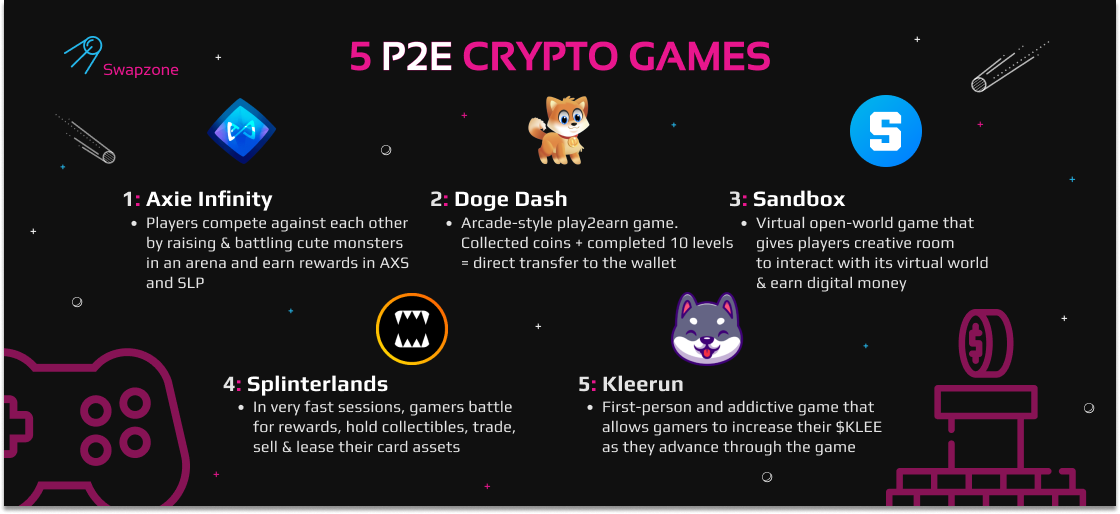Just How Play-to-Earn Benefits Are Changing the Pc Gaming Experience
The advent of Play-to-Earn benefits marks a substantial advancement in the video gaming landscape, changing the emphasis from simple amusement to real financial engagement. This transformation welcomes players to invest not only their time but additionally their monetary resources, promoting a sense of possession and much deeper interaction within video game communities. As diverse demographics welcome these opportunities, new areas arise, blurring the lines between leisure and investment. Yet, this transition elevates important questions concerning sustainability and the future of gaming. What effects could this have for the sector and its gamers?

Advancement of Video Gaming Designs
The landscape of video gaming has undertaken a considerable change over the decades, advancing from traditional pay-to-play versions to much more cutting-edge frameworks that prioritize customer engagement and money making. At first, video games were primarily offered as standalone items, calling for upfront settlements for gain access to. This model, while efficient in producing profits, commonly limited gamer interaction and neighborhood building.

In recent times, the surge of blockchain innovation has actually presented play-to-earn systems that essentially change video gaming characteristics. These designs not just offer a platform for players to gain incentives yet additionally equalize the pc gaming economic situation, permitting users to possess in-game properties. This evolution mirrors a broader fad in the direction of community-driven experiences, where designers and players work together in forming the gaming landscape, eventually redefining just how value is viewed in the gaming sector.
Benefits of Play-to-Earn Equipments
Unlocking brand-new methods for player interaction, play-to-earn systems provide an array of advantages that fundamentally boost the video gaming experience. These systems equip gamers by supplying tangible incentives for their time and effort, fostering a sense of ownership and financial investment in the video game. This inherent motivation drives gamers to involve even more deeply, checking out video game technicians and neighborhoods that they could otherwise ignore.
Furthermore, play-to-earn designs equalize gaming by leveling the having fun field. Gamers from various backgrounds can take advantage of their skills and creativity, enabling brand-new participants to experience economic benefits that were typically reserved for programmers and publishers. This change encourages a much more varied gamer base, improving the video gaming ecosystem with diverse point of views and experiences.
In addition, play-to-earn systems promote area structure, as players collaborate and complete within decentralized environments. This communication grows social links that enhance pleasure and retention, as gamers feel a sense of belonging.
Finally, these systems can result in enhanced long life for games, as consistent player interaction commonly equates into sustained interest and financial investment in future models or developments, making certain a vibrant gaming landscape.
Financial Influence On Players
Play-to-earn systems not just improve gamer engagement but additionally have substantial economic effects for people entailed. These platforms enable players to monetize their time and abilities, transforming video gaming from a pastime into a feasible income resource. As gamers gain copyright or in-game possessions that can be traded or sold in real-world markets, they gain monetary incentives that can significantly impact their personal economic climates.
The economic version promotes a new age of entrepreneurship, as players can purchase various video gaming ecosystems or create approaches to maximize their profits. This possibility for revenue generation brings in a varied market, consisting of those in regions with restricted work possibilities - play to earn rewards. Lots of gamers are now viewing video gaming not simply as enjoyment but as a pathway to financial empowerment.
Nonetheless, it is necessary to recognize the volatility connected with cryptocurrencies and the capacity for market fluctuations to impact profits. Players need to navigate these risks while stabilizing their video gaming and monetary tasks. On the whole, the economic effect on gamers is extensive, reshaping their partnership with video gaming and opening up opportunities for wide range creation in an increasingly digital economic climate.
Neighborhood Structure in P2E Gamings

Players in P2E environments frequently develop guilds or alliances, creating networks that assist in source sharing, strategic preparation, and mutual assistance. These teams commonly take part in cooperative goals or competitors, better enhancing their bonds and enhancing the overall gaming experience. Additionally, community-driven events, such as tournaments and social events, serve to join players, foster sociability, and incentivize involvement.
In addition, designers actively involve with their communities, including responses and pointers that form video game advancement. This collective method not just encourages gamers but additionally makes sure that games advance abreast with player rate of interests, enhancing satisfaction and long-term engagement. Eventually, area structure in P2E games is not article source just a feature; it is a foundational aspect that changes the video gaming landscape into an extra inclusive and interactive atmosphere.
Future Patterns in Pc Gaming
The pc gaming industry's evolution is poised to embrace a number of transformative trends that will redefine gamer involvement and experience. Among the most considerable fads is the combination of fabricated intelligence (AI) to develop even more personalized gaming environments. AI can assess player behavior and choices, permitting developers to tailor experiences that resonate deeply with specific customers.
Additionally, the arrival of virtual and enhanced truth (VR/AR) technologies is readied to enhance immersion, using gamers the ability to engage with electronic worlds in unmatched ways. This will certainly not just elevate gameplay however additionally foster social links, as players can more information work together and complete in common atmospheres.
In addition, the rise of blockchain innovation will certainly remain to affect the gaming landscape, allowing real ownership of in-game possessions through non-fungible tokens (NFTs) This pattern will encourage gamers to trade and monetize their pc gaming experiences, further blurring the lines between video gaming and financial investment.
Verdict
Finally, the development of play-to-earn benefits symbolizes a crucial transformation within the pc gaming industry. By integrating economic rewards right into gameplay, gamers are significantly involved, cultivating a sense of possession and financial investment home in electronic settings. Furthermore, the democratization of video gaming assists in varied involvement, promoting partnership and community building. As these trends remain to evolve, the obscured lines in between entertainment and financial investment will likely redefine the future of gaming, shaping brand-new experiences for gamers worldwide.